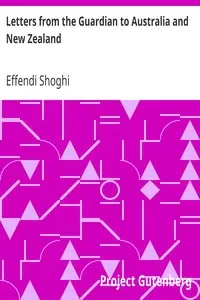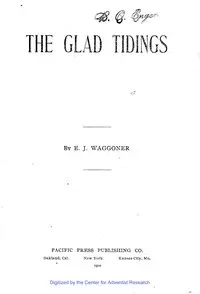"Messages to America" by Effendi Shoghi is a compilation of important letters and telegrams sent to the Bahá'í community of North America between 1932 and 1946. This book acts like a manual for the Bahá'ís, highlighting their duty to spread the beliefs of Bahá'u'lláh, build stronger connections with each other, and commit to growing their community and helping others. The story looks at how the Bahá'í faith grew spiritually and what responsibilities it took on during a time of big changes. The author begins by making it clear how serious and vital it is for the American Bahá'ís to carry out their duties, seeing them as leaders in creating a new and better world. Shoghi Effendi stresses that they must be faithful, devoted, and active in teaching and strengthening the faith, especially given the problems of the world at the time. He points out that every Bahá'í's work matters when it comes to reaching shared targets, reminding them that they have a holy mission to focus on teaching, becoming unified, and finishing their important religious buildings. This beginning creates an atmosphere of honest encouragement and motivation, encouraging readers to learn about and accept their spiritual background as they actively move forward in fulfilling the faith's goals.

Messages to America Selected Letters and Cablegrams Addressed to the Bahá'í's of North America 1932–1946
By Effendi Shoghi
Amidst a turbulent world, a group is tasked with a divine mission to build unity and spread their faith, carrying the torch for a new world based on spiritual principles.
Summary
About the AuthorShoghí Effendi (; Persian: شوقی افندی; 1 March 1897 – 4 November 1957) was an Ottoman-born Iranian religious figure and the Guardian of the Baháʼí Faith from 1921 to 1957. As the grandson and successor of ʻAbdu'l-Bahá, he was responsible for creating a series of teaching plans that oversaw the expansion of the Baháʼí Faith to a number of new countries, and also translated many of the written works of crucial Baháʼí leaders. Upon his death in 1957, the Hands of the Cause, which included his Canadian wife Rúhíyyih Khánum, took on the role of overseeing the transfer of the religion's supreme legal authority to the Universal House of Justice, which has held elections every five years since 1963.
Shoghí Effendi (; Persian: شوقی افندی; 1 March 1897 – 4 November 1957) was an Ottoman-born Iranian religious figure and the Guardian of the Baháʼí Faith from 1921 to 1957. As the grandson and successor of ʻAbdu'l-Bahá, he was responsible for creating a series of teaching plans that oversaw the expansion of the Baháʼí Faith to a number of new countries, and also translated many of the written works of crucial Baháʼí leaders. Upon his death in 1957, the Hands of the Cause, which included his Canadian wife Rúhíyyih Khánum, took on the role of overseeing the transfer of the religion's supreme legal authority to the Universal House of Justice, which has held elections every five years since 1963.
















